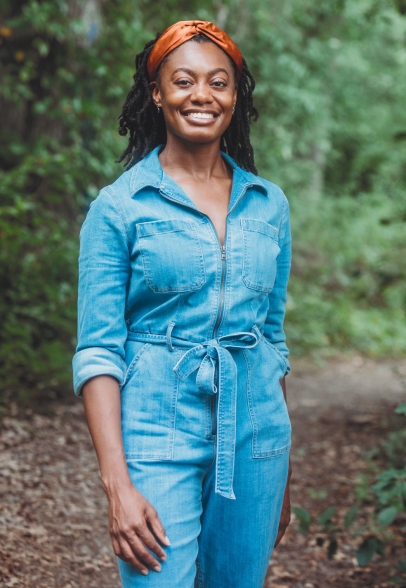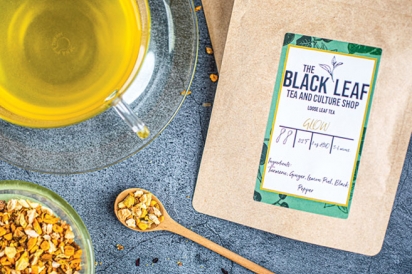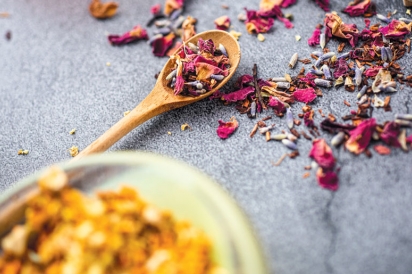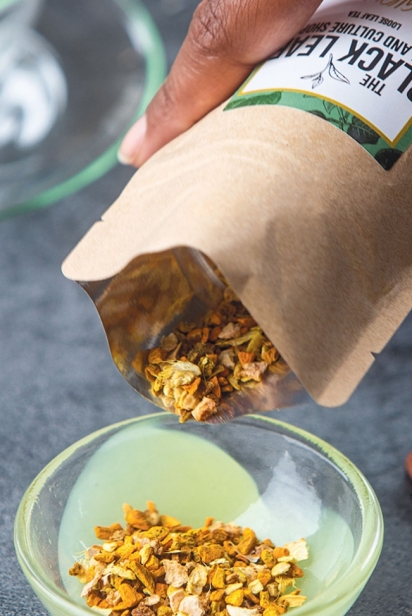The Black Leaf Tea and Culture Shop
Owner/Founder Amber Jackson Steeps a Thoughtful Brew of Comforting Teas and Community Activism
Growing up in a household of female relatives with Southern heritage, Amber Jackson was often given this advice when she felt a little under the weather: “Drink some tea and take a nap.”
Thus, it’s no surprise that a year ago April, Jackson launched her own tea company: The Black Leaf Tea and Culture Shop. She’s a one-woman operation, blending spices with black and green tea leaves, and creating colorful mixes of dried fruits, flowers, herbs and the caffeine-free leaves of the rooibos bush, also with strong-flavored spices.
In addition to sharing her family’s love of tea, both as beverage and home remedy, her grandmother tended a large garden in the backyard of Jackson’s Chicago neighborhood home, as did their next-door neighbor. That led to a lot of trading vegetables and to Jackson’s lifelong interest in food. She majored in nutrition and food science as an undergrad (Middle Tennessee State University) and in food science and product development in grad school (Alabama A&M University).
“I wanted to better understand the actual health aspects of all kinds of food and work in the field of product development,” Jackson says.
That’s certainly evident in the close-ups on Jackson’s website of her tea and tisane ingredients. The photos are alluring and luscious, as they focus on the bright colors of dried fruits, and the enticing shapes of curling leaves and fuzzy round flowers. Jackson sources most of her ingredients from Mountain Rose Herbs—organic and from around the globe—although the Asian tea leaves come from the local Thayer Street importer Leafy Green Tea.
“Developing my tea blends is all trial-and-error,” says Jackson. “I identify all the health properties that I can possibly maximize with each blend, but I also focus on making them taste good. And, I want to share my love of tea.”
For example, the appropriately named Sunday Morning has a soothing mix of chamomile and spearmint, sparked by orange peel and lemongrass. Another uses orange peel plus nutmeg and cinnamon to boost the flavors of elderflower and hibiscus, the latter oft-touted for immune-boosting during these viral times. It’s simply called Home.
Other blends have creative names, such as Chi-der (dried apples with Chai spices) or Coco Bae (black tea with shredded coconut and cocoa nibs). Still others reference Black culture, such as the slang Woosah, originally from the Bad Boys films, meaning to “calm down” or “relax” (catnip, chamomile, lavender and lemon balm) and Haze, a reference to Jimi Hendrix’s “Purple Haze,” because the ingredients (butterfly pea flower, lavender and lemongrass) turn the tisane a brilliant bluish-purple color.
Reaching out to other food or beverage small businesses in Rhode Island, Jackson has already formed collaborations, including one with cocktail lounge Far West (the above-mentioned Purple Haze tea with vodka and lemonade) and another with The Courtland Club (Home tea for a Pink House cocktail).
The second part of her business relates to Black culture, because when Jackson moved to Rhode Island two years ago (to become the team travel manager and financial coordinator for 38 athletic teams at Brown University), she experienced a jolt of culture shock.
“I rarely saw another Black person,” she recalls. “I would go places with my colleagues, but I was always the only Black person in the room. I wanted to create spaces for conversations with people who look like me and who don’t have safe spaces to relate to other Black people.”
“A lot of people here are transplants,” Jackson continues, “but many Black friends and acquaintances didn’t stay here [in Rhode Island]. They left because they felt: ‘Why would I stay here if I don’t see me here?’”
Jackson searched for a meeting group for Black professionals and decided to start her own: “a place for like-minded people to stop by after work and have a drink and some food and get a chance to talk to one another.”
Just as she began to make that dream a reality, the lockdown of Covid-19 hit. But she converted the Black professional mixers to a virtual model, and she’s set up Zoom panel discussions, including one with Black women garden and farming professionals on the topic of food security and one with Black hospitality workers on the topic of racism in that industry. They can be viewed on her website (TheBlackLeafTea.com).
Those discussions were organized through Jackson’s broad network of people in the food industry, with participants from Rhode Island and around the country. She was an engaging facilitator, asking tough questions about making it as a Black woman in farming and gardening or encountering racism as a Black person in hospitality. The latter included four mixologists, a sous-chef and a corporate chef. In both discussions, she deftly drew out each panelist to share experiences and anecdotes.
She also lamented—at that Zoom discussion and later in her online blog—the lack of attention paid to Black-owned businesses until the death of another Black person killed by police or seeing hundreds of Black people tear-gassed during peaceful protests. She appealed to listeners and readers to “be as loud for us for in years to come as you are today.”
Last fall and summer, Jackson marketed her teas at farmers markets and pop-up markets, with great success. She is hoping to eventually have The Black Leaf Tea and Culture Shop as her full-time job, but in this time of Covid-19, she will stick with online orders, discussions and gatherings.
“I want to do this not just for introducing people to the tea,” stresses Jackson, “but for engaging, enriching and celebrating the Black community here in Rhode Island.”
For more information and online ordering, visit TheBlackLeafTea.com.








